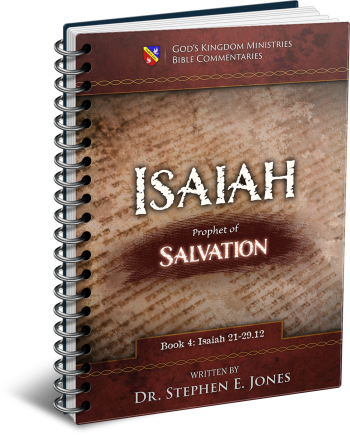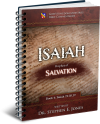Latest Posts
View the latest posts in an easy-to-read list format, with filtering options.

Isaiah is the prophet of Salvation. He is also known as the truly "Universalist" prophet, by which is meant that He makes it clear that salvation is extended equally to all nations and not just to Israel. He lived to see the fall of Israel and the deportation of the Israelites to Assyria, and he prophesied of their "return" to God (through repentance). He is truly a "major prophet" whose prophecies greatly influenced the Apostle Paul in the New Testament.
Category - Bible Commentaries

Isaiah 23 prophesies the fall of Tyre, which was a major Phoenician seaport just north of the Israelite tribe of Asher. It was a prominent commercial center that traded merchandise across the Mediterranean Sea and beyond. Yet Tyre was used as an occasion to prophesy the fall of a greater system thousands of years later, a commercial system based on the law of the sea, maritime law, or international law.
In earlier days Tyre had been under the rule of Egypt, but it had become independent by the time of Solomon, who was allied with Hiram, king of Tyre. Craftsmen from Tyre built the temple in Jerusalem and provided the cedars for its construction. Solomon also built a fleet of ships at Ezion-geber at the north end of the Red Sea to go on mining expeditions around the world. Hiram provided skilled sailors to ensure success (1 Kings 9:26-28).
Hiram also built a breakwater that was 820 yards long and 9 yards wide, making the harbor one of the best in Phoenicia. A small island half a mile offshore was also part of the city.
The Assyrian king Shalmanezer tried unsuccessfully for five years to take the city of Tyre and finally made a treaty with the city in 722 (during the Assyrian siege of Samaria). Sennacherib, however, succeeded, and King Elu-eli of Tyre fled to Cyprus which he then ruled. Sennacherib replaced Elu-eli with the king of Sidon.
In 572 B.C., the mainland city fell to the invading Babylonians after a 13-year siege, and the island offshore was the only portion of the city that remained independent for two more centuries. Alexander the Great conquered the island in 332 B.C., after a seven-month siege. Alexander cast the ruins of mainland Tyre into the water, making a causeway to the island, and was thus able to conquer the island.
(The same year Jerusalem submitted to his rule, for in those days the priests understood the prophecies of Daniel and knew that this was the bronze empire of Daniel 2:32 and the “leopard” in Daniel 7:6. They understood that God had raised up Alexander and that they were to submit to him even as they should have submitted to Nebuchadnezzar.)
By casting every rock and column from the old mainland city into the water to build a causeway to the island, Alexander fulfilled the prophecy in Ezek. 26:3, 4, 5,
3 Therefore thus says the Lord God, “Behold, I am against you, O Tyre, and I will bring up many nations against you, as the sea brings up its waves. 4 They will destroy the walls of Tyre and break down her towers, and I will scrape her debris from her and make her a bare rock. 5 She will be a place for the spreading of nets in the midst of the sea, for I have spoken,” declares the Lord God, “and she will become spoil for the nations.”
Indeed, Alexander scraped all the debris from the mainland city to build the causeway. Afterward, the causeway was used by fishermen to repair their nets. Ezek. 26:14 says further, “I will make you a bare rock; you will be a place for the spreading of nets.” Ezekiel 26:19 says, “when I bring up the deep over you and the great waters cover you.” Tyre was never rebuilt but has remained in “the heart of the seas” (Ezek. 27:27).
The overthrow of Tyre prophesied the destruction of commerce and trade in our own time as well. Though the present “city” is called Mystery Babylon, John drew much of his prophecy from Ezekiel’s description of the overthrow of Tyre. John spoke of “the merchants of the earth” (Rev. 18:3) and described Babylon as a city dressed in “purple and scarlet” (Rev. 17:4; 18:16).
One of the most important things Tyre produced was purple dye that was extracted from sea snails. Purple was highly valued, very expensive, and worn by royalty.
Like Tyre, Babylon was to be thrown into the sea (Rev. 18:21). In other words, it will be judged by the same maritime law that it had used to enslave others. Under Mystery Babylon, maritime law has invaded and largely replaced the law of the land. That is why the gold-fringed Navy flag replaced the non-fringed constitutional flag that rules by the law of the land.
Therefore, when God judges Mystery Babylon, He casts it into the sea. When Alexander cast Tyre into the sea, it was a reversal of fortune. The earth invaded the sea, and this prophesied that the law of the land would ultimately replace the law of the sea—that is, commercial law.
Isaiah prophesied of Tyre’s overthrow, but Ezekiel was given the most detailed revelation about its destruction. We ought to be aware of how Isaiah lays the foundations of revelation more than a century before Ezekiel prophesied.
By connecting these prophesies to John’s description of the fall of Mystery Babylon, we can gain much understanding of what is happening today. The fall of Tyre is a depiction of the fall of Mystery Babylon, especially insofar as its commercial and legal systems are concerned.
Isaiah 23:1 begins,
1 The oracle concerning Tyre. Wail, O ships of Tarshish, for Tyre is destroyed without house or harbor; it is reported to them from the land of Cyprus.
Ships themselves do not wail, but the ships represent the sailors and captains on those ships. The day would come when the wails would come from the merchants and captains on the ships. Their commerce was to be disrupted and curtailed. With the fall of Tyre, the trade in the Mediterranean Sea was interrupted. Supply lines were cut. There were sure to be food shortages, because the ships of Tyre carried wheat from Egypt and Israel to all of the Phoenician colonies on the Sea.
Phoenicia was the Greek name for Tyre, Sidon, Israel, and Judah. The alliance between Solomon and Hiram of Tyre was not the only reason that the Greeks included Israel and Judah with the Phoenicians. Centuries earlier, the tribe of Dan was unable to secure its inheritance in the plain of the Philistines, and so many of them moved to Tyre and Sidon and took to the sea. Hence, the prophetess Deborah, after Israel was set free from the captivity of the Canaanites, complained in Judges 5:17, “why did Dan stay in ships?”
The importance of the Danite sailors (and settlers) is seen in later history, for the Trojan war was fought between the Danaans and the Danai, both of whom were named after their father Dan. They left their mark on many places all the way to Denmark (Danmark) and Sweden. The Danaans were also dominant in Ireland, according to history.
Tarshish (a part of Spain) did not hear about the fall of Tyre directly but received the news “from the land of Cyprus” (Isaiah 23:1).
Isaiah 23:2, 3 continues,
2 Be silent, you inhabitants of the coastland, you merchants of Sidon; your messengers crossed the sea 3 and were on many waters. The grain of the Nile [Sihor, an eastern branch of the Nile], the harvest of the River was her revenue; and she was the market [sakhar] of nations.
The prophet tells the merchants of Sidon to “be silent” (i.e., “shut up”) They should not rejoice over the downfall of their competitor in trade, for this disaster was to affect that city as well. The disrupted supply chains would see shortages of grain from the Sihor branch of the Nile River in Egypt. The prophet probably intended to use Sihor as a homonym whose sound is similar to sakhar, “the market, profit, gain, merchandise.”
The fall of Tyre was more than the destruction of a city. It was the end of world trade in those days and prophesied of the future as well.
This is seen also in John’s prophecy of Mystery Babylon in its commercial aspect. Isaiah 23:4 says,
4 Be ashamed, O Sidon; for the sea speaks, the stronghold of the sea, saying, “I have neither travailed nor given birth, I have neither brought up young men nor reared virgins.”
This, I believe, is a prophetic reference to the law of the sea under which the entire world now lives. The prophet says that “the sea speaks.” Seas do not speak, though they might make a lot of noise. However, the law of the sea speaks loudly, and this law has been developed and refined to the point where it has almost entirely replaced the law of the land.
Casting the mainland city of Tyre into the sea was a prophetic picture of how the law of the land would be overwhelmed by the law of the sea, that is, international law. In America it is in plain sight wherever we go, for every time we see the Navy’s gold-fringed flag in the White House, in the court rooms, and even in the churches, they proclaim that they are under the law of the sea. Wherever a gold-fringed flag is present, the law of the land (constitutional law) has been overwhelmed and does not apply.
The sea thus speaks: “I have neither travailed nor given birth,” yet it holds jurisdiction over every child that is brought forth into the world. Today, that child comes through a birth canal and is birthed (berthed) by a doc (dock). The child is the cargo being delivered to the masters of the sea—the Tyrians or Babylonian merchants.
The child is registered with a birth certificate, which is considered to be a bill of lading, and is given a number for commercial purposes, so that the slave child can be bought and sold on the open market on Wall Street. The name of the child is written in all capital letters, indicating that the living child was born dead (or lost at sea) and that a corporate fiction has replaced that child.
The world of commerce cannot deal directly with the living, so it creates a dead corporation to represent the living man in any court case. The living do not know that they are legally dead, and the judges have become necromancers who talk to the dead.
Hence, the child is capitalized and given a certain monetary value, and the slavery certificate is sent to the Department of Vital Statistics, which then registers it with the Department of Commerce.
Few people understand today’s slavery system that is prophetically called Tyre, Babylon, and other names as well, depending on which aspect of the slave system is being referenced.
Tyre had a robust slave trade as well that is mentioned briefly in Amos 1:9 and for which the prophet condemned the city. It would be interesting to know if they commercialized every citizen of Tyre in those days as it is practiced today under Mystery Babylon.
The prophecies tell us only that the judgment will fit the crime. The commerce of Tyre/Babylon, which enslaves mankind by putting all of us under maritime law and its Uniform Commercial Code, will itself be cast into the sea at the end of the age.